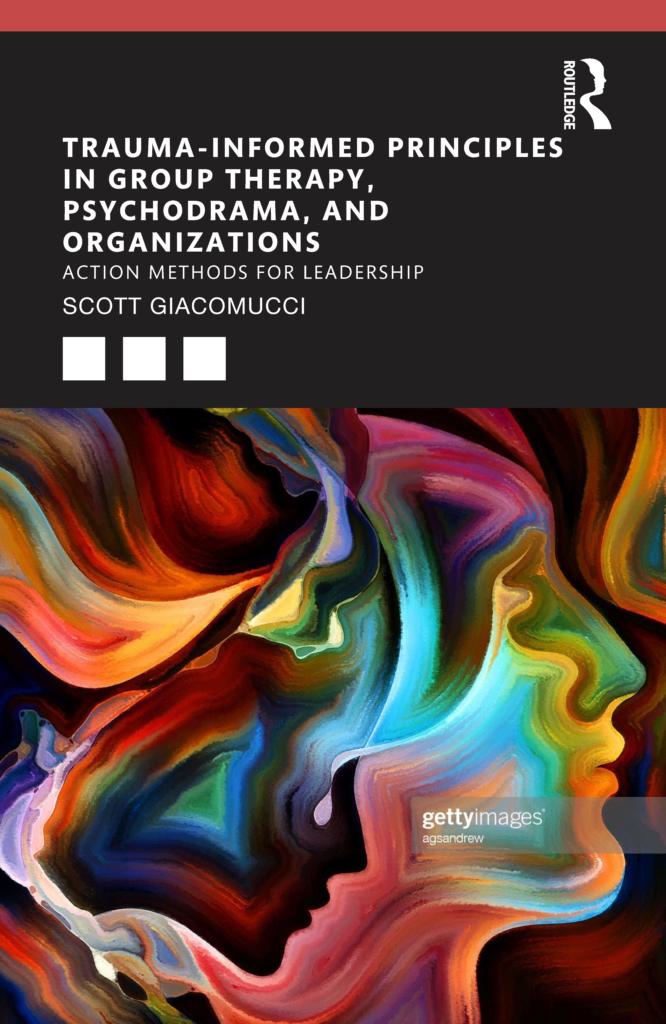We are thrilled to announce a new book publication by Dr. Scott Giacomucci titled:
“Trauma-Informed Principles in Group Therapy, Psychodrama, & Organizations: Action Methods for Leadership“.

“Scott’s book is an important and necessary addition to the field about the specific aspects of psychodrama to a trauma-informed knowledge base on the uses of the dramatic arts in treatment as well as the implications of this work for organizations and for leaders.”
Sandra, L. Bloom, MD, associate professor, Drexel University, Philadelphia, PA, USA; chair of the Campaign for Trauma-Informed Policy and Practice; founder of the Sanctuary Model and Creating Presence
This book presents trauma-informed principles for ethical, safe, and effective group work, psychodrama, and leadership.
Content includes practical guidelines, detailed instructions, and diverse examples for facilitating both trauma-informed and trauma-focused groups in treatment, community, and organizational leadership. Chapters focus on various topics including safety, empowerment, social justice, vicarious trauma, and leadership. Organizational leadership is approached through the lens of SAMHSA’s guidance and the framework of group work leadership. The book includes significant focus on sociometry and psychodrama as strengths-based and experiential group approaches. Psychodrama’s philosophies, theories, and interventions will be articulated through a trauma-informed lens offering psychodramatists, group workers, and organizational leaders new conceptual frameworks and action-based processes. Chapters contain a blend of theory, research, practical guidance, and examples from the author’s experience.
This book will appeal to group workers, therapists, psychodramatists, creative arts therapists, organizational leaders, trainers, facilitators, supervisors, community organizers, and graduate students. This book offers group facilitators the insight and tools to lead engaging and meaningful groups. The potential for retraumatizing participants is addressed while promoting trauma-informed practice as an ethical imperative.
To my professional friends who want to learn more, consider joining us for our upcoming CEU events that will focus on teaching content from the book.
I intentionally wrote the book in a way that would be attractive for a large audience including psychodramatists, scholars/researchers, practitioners, activists, educators, supervisors, and creative arts therapists. The chapters on practice include many examples of how to use experiential processes in a trauma-informed way within diverse group settings and organizations.
The book is sold as softback and hardback versions through the publisher Routledge (and all major book sellers). As an professional book, it will also be indexed in academic databases for students, professors, and researchers (through your university subscriptions). If you found the book useful, it would be incredibly helpful to the book’s visibility if you wrote an honest Amazon review about the book.
Consider joining our mailing list or follow our social media pages (facebook, linkedin, & instagram) to be the first to hear of book updates!
Thanks to all of you, the book as reached the #1 New Release spot in Amazon’s Psychotherapy books category in April 2023!
Book Endorsements:
“Scott Giacomucci has eloquently elucidated ways that organizations can incorporate SAMHSA’s trauma-informed principles into their policies and practices. Scott has thoughtfully and skillfully integrated these important ideas with psychodrama and sociometry, creating a powerful synthesis. This book will empower leaders to put trauma-informed care into action.”
Catherine D. Nugent, LCPC, TEP, former chief, SAMHSA/CSAT Workforce Development Branch; executive director, Laurel Psychodrama Training Institute; past president, American Board of Examiners in Psychodrama, Sociometry & Group Psychotherapy
“In this seminal book, Giacomucci skillfully explains the integration of trauma-informed care and psychodrama principles, providing a road map for theory, methodology, and psychotherapeutic applications. Readers will appreciate clearly articulated concepts and strategies that can be immediately incorporated into clinical work, group therapy, supervision, peer consultation, and trauma-informed programming across numerous settings. This volume greatly expands the intersection of psychodrama approaches and the field of traumatic stress while also incorporating leadership, ethical, and culturally-resonant practices that form the core of trauma-informed work.”
Cathy A. Malchiodi, PhD, director, Trauma-Informed Practices and Expressive Arts Therapy Institute, 2022 Cecil and Ida Green honors chair, and author of Trauma and Expressive Arts Therapy: Brain, Body, and Imagination in the Healing Process (2020), and Handbook of Expressive Arts Therapy (2022)
“Scott Giacomucci examines the practice of group therapy, psychodrama and leadership introducing and expanding on elements of trauma-informed care in each of the practice models. Reviewing the developmental history of the three, and integrating his own significant practice and academic experience, he reminds the reader of the importance of respecting both the healing potential as well as the potential for harm in each.”
Lawrence Shulman, MSW, EdD, dean and professor emeritus, School of Social Work, University at Buffalo, State University of New York; author of The Skills of Helping Individuals, Families, Groups, and Communities (8th edition) (2018) and Dynamics and Skills of Group Counseling (2010)
“Scott Giacomucci has produced a singularly rich work on psychodrama theory and practice. Deeply informed by the literature on trauma and its treatment in various settings, his thoughtful and imaginative guidance is so very much needed in these troubled times.”
Jonathan D. Moreno, PhD, David and Lyn Silfen University professor, University of Pennsylvania; author of Everybody Wants to Go to Heaven but Nobody Wants to Die: Bioethics and the Transformation of Healthcare in America (2020); The Brain in Context (2019); and Impromptu Man: J.L. Moreno and the Origins of Psychodrama, Encounter Culture, and the Social Network (2014)
“This book presents the articulation of J.L. Moreno’s legacy with current research in the area, making it an important contribution on the effectiveness of trauma treatment. The foundation of the basic principles of the practice, including the benefits of teletherapy, and the didactic presentation of guidelines and instructions make this textbook a necessary resource for a whole new generation of professionals dedicated to working with groups and trauma. Scott Giacomucci reached his commitment with Zerka Moreno to bring the psychodramatic method to new generations.”
Heloisa Fleury, MA, psychologist/psychodramatist in private practice, São Paulo, Brazil; president, International Association for Group Psychotherapy & Group Processes; editor-in-chief, Brazilian Journal of Psychodrama; co-editor of Psychodrama in Brazil (2022) and multiple other books.
“Scott Giacomucci has presented a well-researched text on group therapy and psychodrama including emphases on teletherapy, ethics, and organizations. A truly needed text to have on the bookshelf of every group worker, psychodramatist, and leader.”
Daniela Simmons, PhD, TEP, president, American Society of Group Psychotherapy & Psychodrama; creator & CEO of Tele’Drama International; Dallas, Texas, USA
“With this book, Scott Giacomucci makes a substantial contribution to the literature of group therapy and psychodrama. His integration of the principles of Trauma Informed Care with professional ethics as they apply to group therapy and psychodrama is a major advancement of the field and the treatment of clients, many of whom have histories of complex trauma. He has incorporated his extensive knowledge of the psychodrama literature and practice with contemporary advances and issues in the trauma field to offer a detailed and innovative group treatment model, applicable in many settings and organizations. His emphasis on safety and the safeguarding of clients from retraumatization and therapists from vicarious trauma is exemplary as is his emphasis on the promotion of healing through connections with others.”
Christine A. Courtois, PhD, ABPP, psychologist/consultant in private practice (retired); author of Healing the Incest Wound (1988; 2010), It’s Not You, It’s What Happened to You (2014; 2020); and co-editor of Treating Complex Traumatic Stress Disorders in Adults (2009; 2020)

